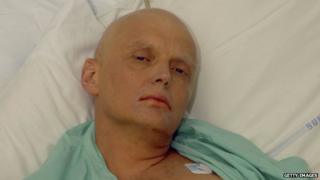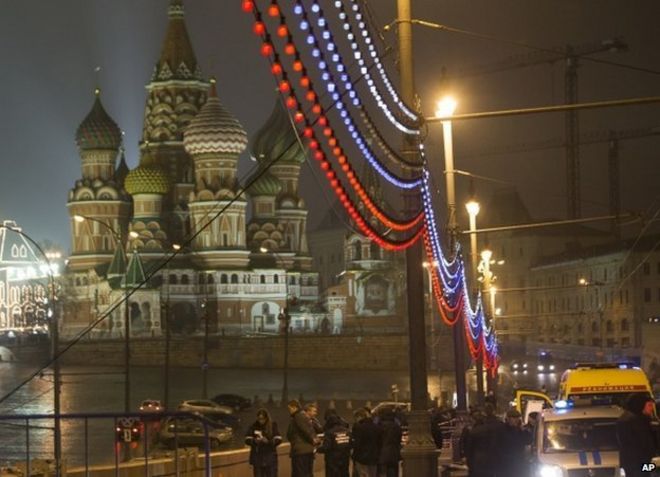Assassin Unknown?
Assassin Unknown?
 |
"It's essentially an attempt to remove him as a threat. They consider this with a classic KGB mentality: 'no man, no problem'." "By removing him [Navalny] personally, they aim to kill the brand and end the team. ...[But] it's a grave mistake by the Kremlin to think that without him the movement stops." "Look at Belarus. It is a YouTube revolution. Tikhanovskaya is the Belarusian Navalny." Vladimir Milov, former Russian deputy energy minister
"[Navalny's reply to the question, 'Why do you think you're not being killed and what happens if you are?' was: 'it's a dangerous place and that's why I'm talking to you -- in the hope you can work on our common cause']. So this was something he already had in mind." "He's the only threat the ruling party is facing." Sergei Gurlev, professor, Sciences Po, Paris
"He really got under the skin of people who have big country houses and lavish mansions, but I wouldn't say he was such a threat to the regime that it had to bump him off." "If there isn't a convincing public investigation the opposition will point the finger at the authorities. If they weren't involved, it shouldn't be hard to get to the bottom of it and find some sort of scapegoat, and that could be absolutely anyone. There are a fair number of crazy people sitting in the woods with grenade launchers." "But it's definitely not Putin and it's definitely not the government. At least I hope so. That would really be beyond the pale." Unidentified go-between with senior Kremlin officials
"We don't know for sure whether it was personally ordered by Putin. But we understand that he created the conditions where this can happen and the people responsible won't be punished or suffer any repercussions." Vladimir Ashurkov, executive director, Navalny's foundation
 |
Once the howls from the international community and their leaders became sufficiently intense, bolstered by person-to-person persuasive arguments by telephone between the two most influential EU heads of state, and a personal intervention by Italian prime minister Giuseppe Conte, Russia's Vladimir Putin agreed to engage in a pursuit for the identity of whoever it was that was responsible for the attempted murder of Alexei Navalny, the irritating gadfly who was so rudely attempting to unseat Mr. Putin and his party from power.
 |
| Sergei Skripal, daughter Yulia, targeted with Novichok, 2018. Getty/Michael Howard |
According to a public statement that followed from Russia's parliamentary speaker, Vyacheslav Volodin, a separate investigation would be led by him to determine whether the poisoning was "an attempt by foreign powers to harm the health of a Russian citizen with the aims of creating tensions within Russia and making yet more accusations against our country". Progress can be seen in that Mr. Putin and his Kremlin allies no longer deny that Mr. Navalny was poisoned. Regression to the same old is recognized in Mr. Volodin's outrage that an 'outside entity' such as a "foreign power" would dare to harm a Russian citizen, much less purpose to wreak unrest within the country.
And though German Chancellor Angela Merkel joined with French President Emmanuel Macron to offer medical services and asylum to the victim of a poisoning attack, and Ms. Merkel whose Germany is now hosting Mr. Navalny at the Charite hospital in Berlin, has no intention of estranging Russia from Germany, intent on maintaining open diplomatic ties and with the diplomacy firm political ties in the belief that open lines must be required as a requisite for persuasive relations with Russia.
 |
Alexei Navalny, 44-year-old passionately committed political activist is so detested by Russia's presidential spokesman Dmitry Peskov that he refers to him singularly not by name -- a curse that will not pass his lips -- but as 'the patient', a truly pejorative curse spat out in disgust. But then, Mr. Navalny is not only a political activist, but a socially moral one, outraged by the corruption of Russian oligarchs amassing great fortunes at the expense of the ordinary Russian citizen in a collaborative arrangement between themselves and government.
As a result, he is detested not only by the Kremlin and Russia's president, but by powerful men whose intimate contacts where they count, and whose uncountable wealth is under attack by this painfully annoying upstart. Alexei Navalny's activism and direct appeal to ordinary Russians to expect more from their political leaders - than to build up arms, contest the West, interfere with other nations' civil wars and insurrections, and enrich themselves and their allies at the expense of the general public when they should be governing justly with fair outcomes, lifting the population into security -- has gained him the support of the public.
 |
| Litvinenko met with former KGB contacts, London, 2006 Getty Images |
In the past five years six violent attacks have taken place against Russian dissidents. The international notoriety that Russia gained when the eyes of the world swivelled to Britain at the attempted murder by poisoning in Britain of former double agent Sergei Skripal with the nerve agent novichok, following on the earlier murder of Alexander Litvinenko with the use of polonium-210, left no doubt that Russian government hardball against those the Kremlin considers traitors is real and it is deadly.
 |
| Mr Nemtsov shot on a bridge in view of St Basil's Cathedral & the Kremlin AP |
And
of course, in 2015 opposition leader Boris Nemtsov was put out of
contention as a potential threat to Vladimir Putin's plans to govern
uninterrupted for the rest of his life when he was shot four times in
the back ensuring he would never again contest Russia's presidential
reign in perpetuity by a man who brooks no criticism. In this bold and
shocking killing by an unidentified gunman, President Putin took
personal control of the investigation to discover who might have been
behind the dastardly plot to remove a formidable political opponent of
the president. Still under investigation.
State efforts to silence Mr. Navalny grew in lock-step with his popularity, when over the course of the years he was jailed on thirteen occasions for protests directed against Mr. Putin, and finally sentenced to six years in prison on embezzlement charges (!) in 2013; whatever it would take. He was subjected to violent attacks; a chemical substance thrown at him, blinding him in one eye. He also believes that when he took ill during one of his jail sentences an attempt had been made to poison him.
 |
| Anna Politkovskaya shot dead in Moscow. Getty/Michael Howard |
According to the Levada Center, an independent pollster, a June survey found that Mr. Navalny was viewed as Russia's second most "inspirational" leader following directly after the number-one candidate, Vladimir Putin. In Belarus over two weeks of mass protests followed the corrupt re-election of Alexander Lukashenko who has ruled the country for the past 26 years, backed by the Kremlin. There, blogger Sergei Tikhanovsky built a YouTube following modelled on Navalny's modus operandi.
Germany has offered asylum to the combative, but now still-comatose Navalny whom the Kremlin continues to deny having had any intention to harm. For an example of the kind of courage that Navalny possess, one only need look to the example of the man whose campaign against corruption reflected Navalny's own. Sergei Tikhanovsky was arrested in Belarus, leading his wife Svetlana Tikhanovskaya to run in the election for her husband, becoming the focal point of the protests.
"I
can give you 120 percent that he will never do that [accept Berlin's
officer of asylum]. He will stay in Russia and continue to do what he
does. The biggest gift we could give to those people in the Kremlin is
if we got up and ran", stated activist Vladimir Kara-Murza another Navalny colleague who had survived two attempts on his own life.
 |
| Alexei Navalny, pictured here at the centre of a 2018 rally, is expected to survive the poisoning but remains unconscious in a serious condition. Anti-Putin protesters in the far east of Russia now chant Navalny's name, demanding justice. Credit:AP |
Labels: Assassination, Barbarity, Russia
Labels: Opposition, Russia, Vladimir Putin

0 Comments:
Post a Comment
<< Home